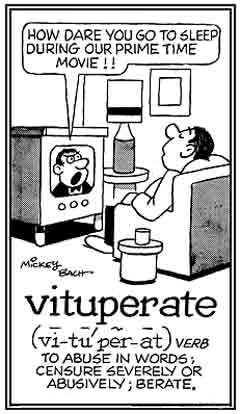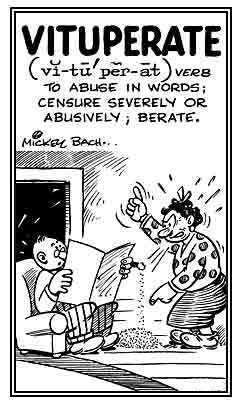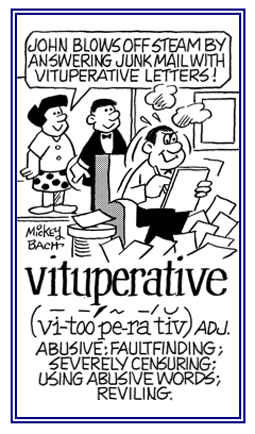par-, para-
(Latin: to make ready, to get ready, to put in order; to furnish, to prepare)
sever (verb), severs; severed; severing
1. To divide by cutting or slicing; especially, suddenly and forcibly: When gardening, Jack had to sever or lop off the lowest tree branches with an axe.
2. To put an end to a connection or relationship; to break off: After many harsh words and many misunderstandings about the past, Jessica severed all correspondence with her family and moved to a different town.
3. To disunite; to disconnect; to terminate: Little Tommy accidentally severed or interrupted the link between the computer and the internet by pressing all the buttons on the router!
4. Etymology: from Latin separare, "to separate”; from se-, "apart" + parare, "to provide, to arrange".

© ALL rights are reserved.
Go to this Word A Day Revisited Index
2. To put an end to a connection or relationship; to break off: After many harsh words and many misunderstandings about the past, Jessica severed all correspondence with her family and moved to a different town.
3. To disunite; to disconnect; to terminate: Little Tommy accidentally severed or interrupted the link between the computer and the internet by pressing all the buttons on the router!
4. Etymology: from Latin separare, "to separate”; from se-, "apart" + parare, "to provide, to arrange".

Go to this Word A Day Revisited Index
so you can see more of Mickey Bach's cartoons.
several
severally
sound-conducting apparatus
The various parts of the external and middle ear whch collect and conduct sound waves to the inner ear.
sound-perceiving apparatus
1. The many interrelated components concerned with the perception of sound; including by implication, the sound-conducting apparatus.
2. The inner ear and its central connections.
2. The inner ear and its central connections.
stereotaxic apparatus
An instrument used for the precise placement of devices into the brain for purposes of recording, stimulation, injection, or destruction of certain parts.
unpreparedly
vituperable (adjective), more vituperable, most vituperable
Blameworthy, or deserving severe censure or blame: Driving through a red light at the intersection was a vituperable action and deserved the ticket that was issued by the police officer.
vituperate (verb), vituperates; vituperated; vituperating
1. To rebuke or to criticize harshly or to berate: Martin's mother was vituperating him for tracking in so much mud from his shoes when he came in from the rain.
2. To attack someone in a violently abusive or a severely critical language; to revile: Sabina's supervisor vituperated or strongly criticized her for not getting her report in on time.
3. Etymology: from Latin vituperat-, "censured, disparaged"; from the verb vituperare; from vitium, "fault" + parare, "prepare".

© ALL rights are reserved.

© ALL rights are reserved.

© ALL rights are reserved.
Go to this Word A Day Revisited Index
2. To attack someone in a violently abusive or a severely critical language; to revile: Sabina's supervisor vituperated or strongly criticized her for not getting her report in on time.
3. Etymology: from Latin vituperat-, "censured, disparaged"; from the verb vituperare; from vitium, "fault" + parare, "prepare".



Go to this Word A Day Revisited Index
so you can see more of Mickey Bach's cartoons.
Bitter and insulting language including angry criticism: The supervisor used vituperations to let Marsha know that she had really made some serious blunders in her assignment.

© ALL rights are reserved.
Go to this Word A Day Revisited Index
Some voters are getting fed up with all of the vituperations that are being thrown back and forth during the campaign.
This vituperate image provides an example of what vituperation means.

Go to this Word A Day Revisited Index
so you can see more of Mickey Bach's cartoons.
vituperative (adjective), more vituperative, most vituperative
Marked by harshly derogatory criticism and faultfinding: Many voters are sick and tired of hearing all of the vituperative comments made towards each other by both political parties during the election.

© ALL rights are reserved.
Go to this Word A Day Revisited Index
Some talk-show hosts make more vituperative remarks about their political rivals than is justified or rational.

Go to this Word A Day Revisited Index
so you can see more of Mickey Bach's cartoons.
vituperatively (adverb), more vituperatively, most vituperatively
A description of the way harshly invective information is passed on verbally: Agnus vituperatively directed her anger towards the guy who ran the red light and banged into her new car.
vocal apparatus
In humans, the structures within the respiratory apparatus, particularly the components of the larynx, that are concerned specifically with phonation, or the production of speech.

